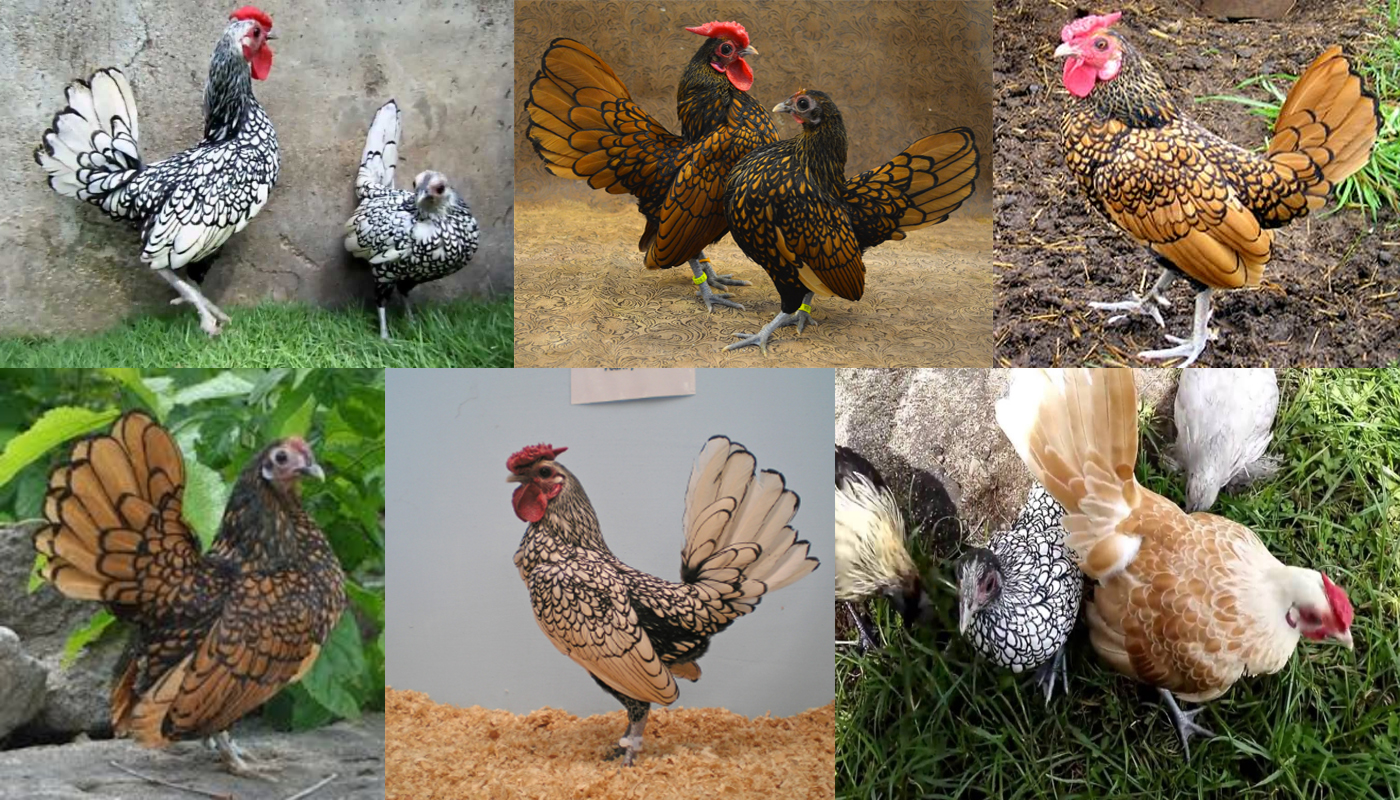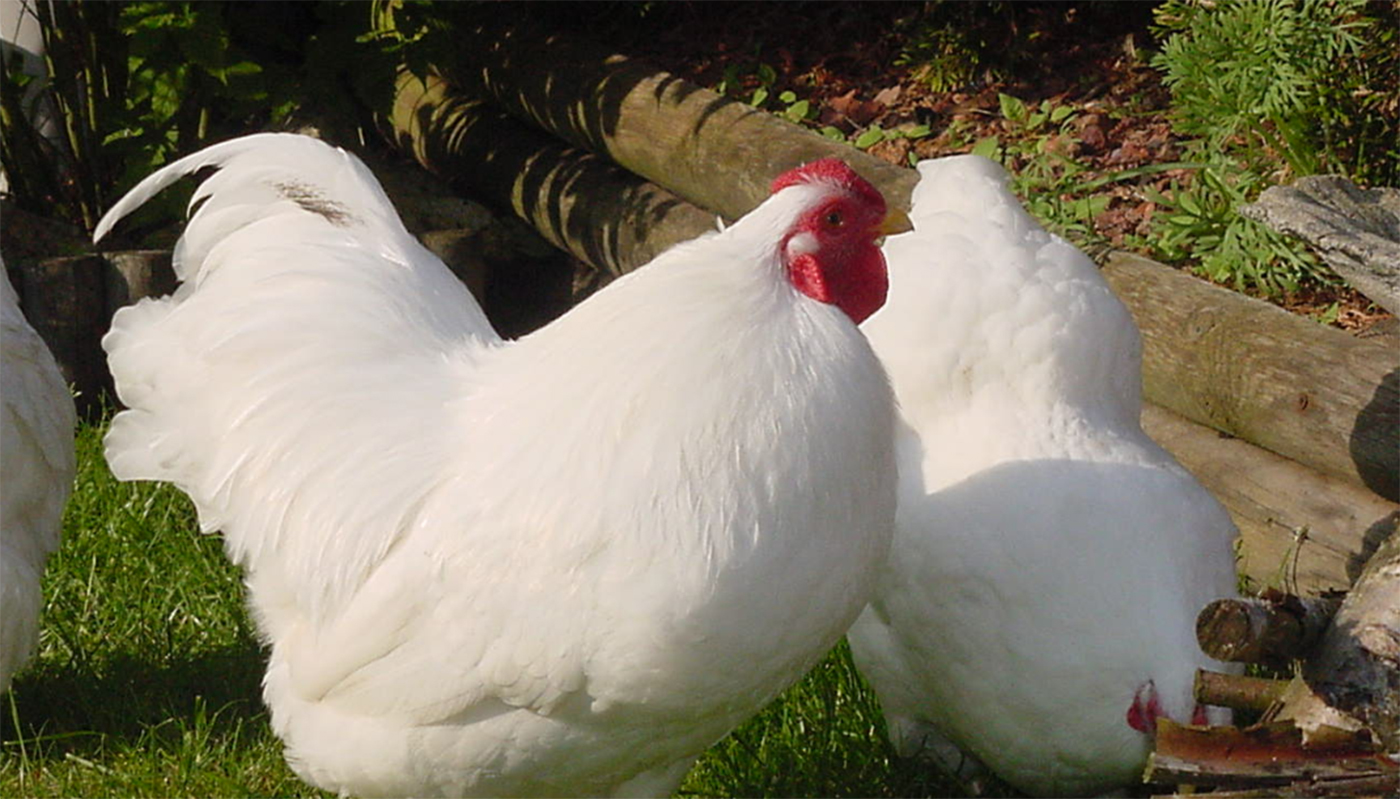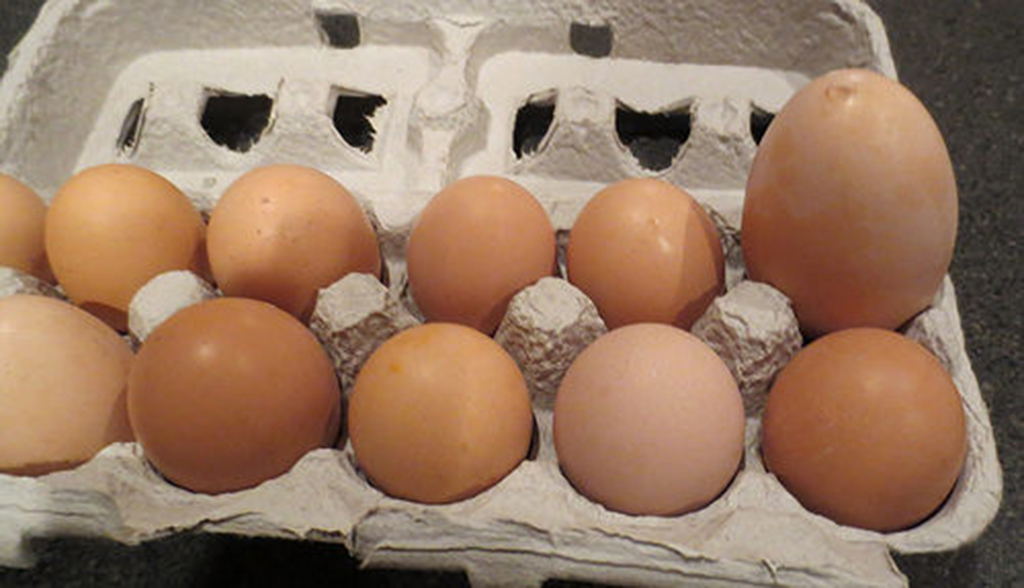
The Appenzeller is a very interesting looking chicken that originates from Switzerland. There are two types of Appenzeller and they are the Spitzhauben and the Barthuhner varieties. Whilst both Appenzeller originate for Appenzeller, Switzerland that is where the similarities end.
The Spitzhauben (meaning lacy bonnet) have feather crests and a V-comb (this is true in both the males and females). Whilst the Barthuhner (meaning bearded hen) both the male and females have no crest and sport a rose comb.
In the UK the breed does come in a Black Spitzhauben but in America, they are mainly the silver-spangled variety. The spangled varieties look like they are wearing black polka dots on their plumage and a fancy bonnet on their heads. The Barthuhner which comes in Black, Blue, Laced and Black-red has feathers puffed up under their beaks making them look like they have puffed up beards. These beards hide the hen’s small wattles making them able to withstand the extreme cold conditions.
HISTORY
Appenzellers are not recognized in America by the American Poultry Association although there is a push to get the breed accepted.
These birds are the national breed of Switzerland and were bred in the Appenzell region of Switzerland. In this region, the women wear a ceremonial lacy bonnet called a Spitzhauben.
They were brought to America by a doctor Albert McGraw after World War II. They are mostly kept as show or ornamental birds although they do lay a decent amount of medium sized eggs per week.
This breed is quite rare in America but mostly available in Europe. The American Spitzhauben gene pool tends to have quite a few breeding defect issues. They tend to suffer from suppressed immune systems and lymphoid leukosis due to the shallow gene pool and inbreeding.
CHARACTERISTICS |
|
|---|---|
| Country of Origin: | Switzerland |
| American Poultry Association: | Not recognized by the APA but there has been a push to get the bird accepted in the United States |
| Chicken Category: | Medium to small breed |
| Chicken Class: | Not recognized |
| Bantam Variety Available? | No |
| Related | TOP 10 BANTAM CHICKEN BREEDS FOR BEGINNERS |
IDENTIFICATION⇒ |
Appearance: A light chicken with a compact body and clean legs. They tend to have large nostrils and brown eyes.
Color(s): Hens and roosters are sliver spangled or gold spangled. The most common color being the silver-spangled.
Comb: They have a V-comb
Ave. Weight: Hens/Pullet 3 – 4 lbs.
Cockerel 4 lbs. |
| Life Expectancy: | The average lifespan is 8 years. |
| Good Starter Chicken? | As they are a rare breed in America they would not make the best starter chicken for a flock. |
| Related | 10 BEST STARTER CHICKENS FOR THE FIRST TIME POULTRY KEEPER |
PURPOSE⇒ |
Eggs: They are average layers
They lay medium white eggs up to 156 per year They lay steadily all year round. They start to lay eggs from around 6 months old.
Meat: They make a fair table chicken
Breeding: They can be bred but the hens are not really broody, nor do they make the best mothers.
If you are breeding Appenzellers it is best to get the help of a registered breeder. They have a very limited gene pool in America. Thus, there will be breeding defects. For advice on breeding please check our guide to breed poultry. If you are a first-time breeder it is best to get professional advice from your local animal shelters, poultry farmers or vet.
Foraging: Excellent foragers that love to free range and roost in trees.
Show Bird: They make excellent show birds
Pets: Appenzellers are friendly birds and show great intelligence.
Other: They thrive in a free-range environment and will spend hours exploring the garden.
They will give your organic garden a lot of nutritious fertilizer to ensure great blooms and tasty vegetables. If you need to confine the birds it is best to ensure that they have a large enclosed run that has a few small trees or tree stumps with branches on. |
| Health: | They are quite hardy birds but due to a limit gene pool in America do tend to suffer from birth defects. As well as immune system problems that lead to various illnesses. |
| You may Also Like: | HOW TO TELL IS A CHICKEN IS SICK |
| Temperament: | Friendly, inquisitive and intelligent chickens. |
| Flyers? | They can fly and will if they have to, but they are not very flighty birds. They love to stay close to their roost. |
| Noisy Birds? | Appenzeller does tend to be a noisy bird. |
| Interaction with other chickens: | They do not mind other chickens, but the roosters can become quite aggressive around breeding time. As with any flock if you are introducing new birds it is best to slowly socialize them with the flock. |
| Good with kids? | They are good and very tolerant around children. |
| Related | 10 ROOSTER BREEDS THAT DO NOT MIND CHILDREN |
| Socialize Behavior? | They get along well with all other animals and will try to chat with them. |
| You may Also Like: | HOW TO SOCIALIZING YOUR NEW CHICKENS |
| Known predators: | Most domestic animals leave them alone, but it is always best to keep an eye on dogs and cats. If hawks and or foxes are in your area it is always best to take precautions. Check with local animal shelters, zoos, vets, animal control and or pet stores about common predators in your area. |
| Conservation Status: | These birds conservation status is recorded as “threatened”. It is best to check on any special license or instructions that may be set up for owning these birds. This can be checked with your local or national conservation centers. |
IDEAL ENVIRONMENT⇒ |
Garden Size: They do not do very well in confinement and tend to enjoy a medium to large size garden. They are excellent climbers and love trees to roost in.
Ideal Climate: This is one breed that does well in both hot and cold climates.
Ideal Coop: The rule of thumb for any coop is 50 cm x 50 cm per hen/rooster in the coop.
Ensure there is a good space for the nesting boxes and nightly roosting rails at least 1.5 inches wide. Good ventilation for air but not too drafty especially in winter. It is always a good idea to raise the coop off the ground to give the birds a dry place to roost and lay especially in wet weather.
Ideal Coop Run: They are not very flighty birds, but it is still a good idea to completely cover the coop run with a good chicken mesh.
Ideal Flock Size: The Appenzeller like to socialize so it is best to have at least three hens in your flock.
Special Instructions: They do not have any special grooming requirements, but they can have health issues due to their gene pool.
Accessories: The following accessories are ideal for your coop:
Nesting boxes Straw for the boxes and roosting area Roosting rails Perches Water troughs/bowls Food bowls/feeders Heating lamp(s) Animal carrier for transport purposes |
| You may Also Like: | 45 FREE DIY CHICKEN COOP PLANS, TUTORIALS AND DESIGNS |
WHERE TO FIND THESE BIRDS TO ADD TO YOUR FLOCK
This is quite a rare breed in the United States, but you can still find them at some chicken hatcheries throughout the USA.
Some live poultry outlets and farms may also keep them, some get them from the registered breeder and breeding clubs. Always check with your local conservation centers and poultry breeding clubs as they are a registered breed. If you plan on breeding your chickens, you will want to make sure that they are from a good bloodline.
Most conservation or poultry breeders will also be able to help with any special requirements, attention or care these chickens may need.
CARING FOR THE BIRD(S)
Please click here for our full guide to “Taking care of chickens”. This is a comprehensive guide to owning chickens. It covers where to start from choosing your ideal flock, the coop that would best suit your garden, your bird and you to buying and bringing your bird(s) home.
GENERAL
The Appenzeller will keep you entertained and be a good garden company as they are always ready and willing to discuss their day with anyone who will give them attention.
As they are excellent foragers you will enjoy a pest free garden and they will even keep you trees pest free. They love to climb and will lazily root up a tree during the hot hours of the day.
GROOMING
As they are happiest being out and about in the garden giving them regular checks for mites, lice and various other parasites is a definite must at least once a week. Because they may come in contact with water and other animals in the garden they should be de-worming regularly for more information of de-worming your Appenzellers speak to your local vet.
DIET AND NUTRITION
Every morning it is best to feed your Appenzellers their normal food such as chicken pellets, grains, chicken mash or grain mix from 8 weeks old and older. Foraging foods and table scraps such as vegetable or fruit leftovers are a nice after meal treats for your chickens. They love some meal-worms as a rare treat ever so often.
For baby chickens, the best is always Chick Starter when they are under 8 weeks old.
Laying hens should get extra protein and calcium in their diets to ensure the quality of their eggs and to keep them in tip-top health.
Please see our comprehensive guide to “Feeding your chickens” for more information of the different types of chicken feed for chicks, hens, laying hens, roosters, etc. and where to buy the feed and approximate cost of the feed.
SOCIALIZING THE BIRD(S)
The Appenzeller will get along with most breeds and not really aggressive chickens they tend to rather fall into the pecking order.
But as they are prone to some diseases and their immune systems are not as strong as most chickens it is best to make sure newcomers are quarantined until they are deemed disease-free.
Always check on how well a breed will get on with your current flock before buying them as you do not want to upset your coop or stress your current flock.
If you want to introduce another breed with you Appenzellers try a breed that has a gentle nature that also socializes well with other birds.
You may want to look at a strict quarantine of the new chickens of 31 days to ensure they do not have any unwanted critters or disease that could spread to your Appenzellers.
Even though they are friendly sociable birds, even they have a pecking order, so it is advisable to socialize them slowly and determine when it is right to allow them to become a permanent part of the flock.
NOTES / SPECIAL INSTRUCTIONS
As they are registered as a “threatened” conservation status they may need an extra license to own or keep in your garden. For advice on what the bird’s conservation status and orders are please check with your local conservation department.
For breeders, it is imperative that you always check your bird’s bloodlines and ensure you are buying your birds from a reputed breeder/farm. In order to sell birds of such stature, they have to be recorded and documented, always check with local animal breeding organizations for these records.
These legitimate documents are also required should you wish to show your bird(s) in various poultry shows/competition showings.
For information and advice on adopting rescued animals, you can visit or contact your local animal welfare center.
Video
USEFUL LINKS
- Caring for your Chicken
- Feeding
- Health
- Socializing your Chicken
- Breeding Chicken
- Raising Chickens A-Z
- Hatching Eggs
- What is Molting
- Animal Shelter (ASPCA)
- American Veterinary Medical Association
- American Poultry Association
- American Animal Welfare Society
- American Animal Control
- American Animal Husbandry Society
References
- https://en.wikipedia.org
- https://livestockconservancy.org
- https://www.roysfarm.com
- https://www.mypetchicken.com
- https://www.backyardchickens.com
- https://www.feathersite.com/
 Feathers Across Borders: Discover 15 Unique Chicken Breeds Worldwide
Feathers Across Borders: Discover 15 Unique Chicken Breeds Worldwide The Top 10 Backyard Chickens to suit any Coop or Garden Size
The Top 10 Backyard Chickens to suit any Coop or Garden Size Sebright Chicken Breed – Everything You Need to Know
Sebright Chicken Breed – Everything You Need to Know Aseel Chicken Breed – Everything You Need to Know
Aseel Chicken Breed – Everything You Need to Know HOW TO TELL IS A CHICKEN IS SICK
HOW TO TELL IS A CHICKEN IS SICK Top Chicken Breeds for the Smaller Urban Backyard or Confinement
Top Chicken Breeds for the Smaller Urban Backyard or Confinement Chantecler Chicken Breed – Everything You Need to Know
Chantecler Chicken Breed – Everything You Need to Know CONDITIONS THAT AFFECT THE A CHICKENS FEATHERS
CONDITIONS THAT AFFECT THE A CHICKENS FEATHERS 10 Chicken Breeds for the Hot Climates
10 Chicken Breeds for the Hot Climates EXTERNAL PARASITES ON A CHICKEN
EXTERNAL PARASITES ON A CHICKEN Top 10 Jumbo and Extra Large Egg Laying Chicken Breeds
Top 10 Jumbo and Extra Large Egg Laying Chicken Breeds 45 FREE DIY CHICKEN COOP PLANS, TUTORIALS AND DESIGNS
45 FREE DIY CHICKEN COOP PLANS, TUTORIALS AND DESIGNS